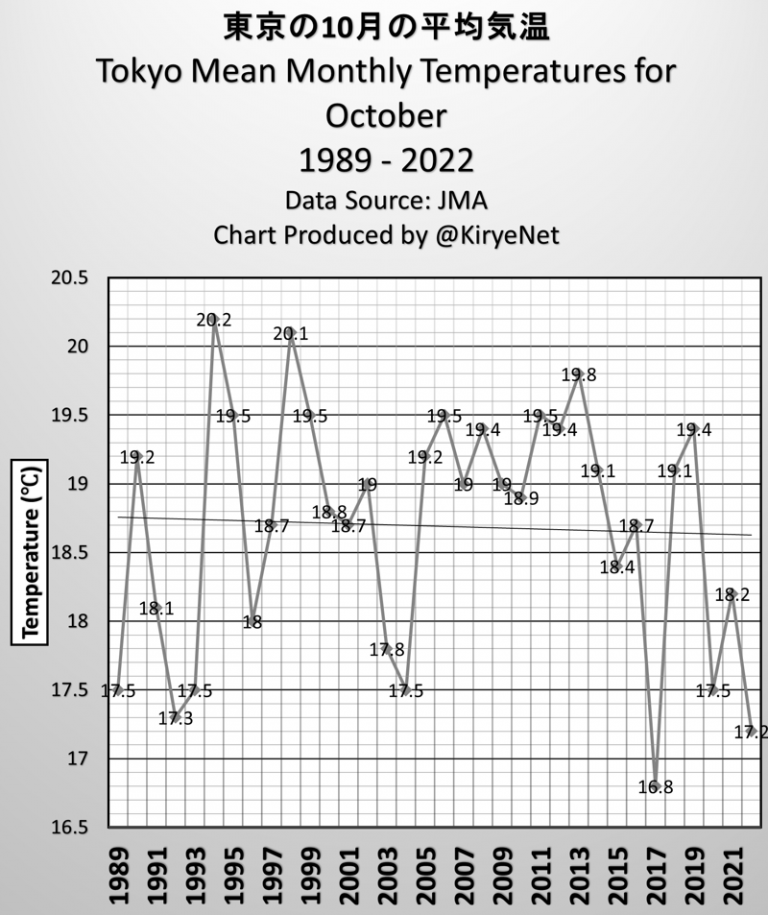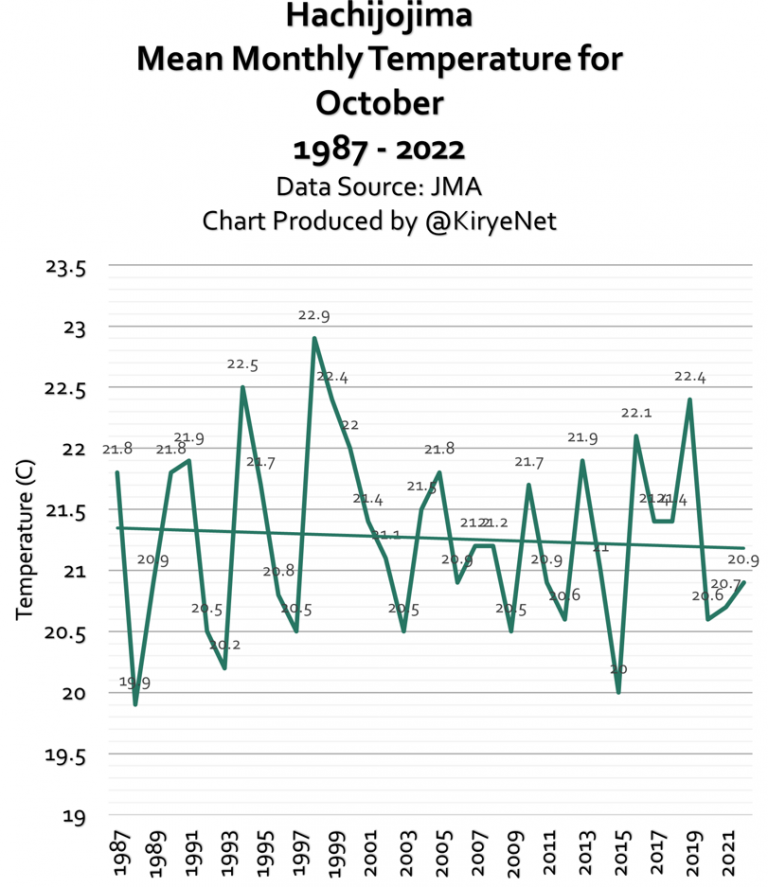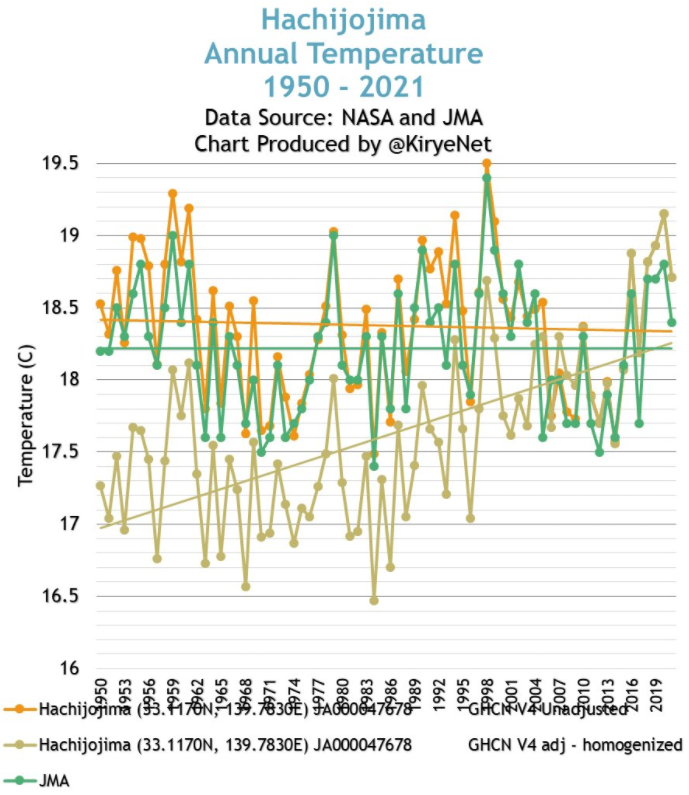Charts produced by Kirye
This October, according to the (untampered) data from the Japan Meteorological Agency (JMA), the mean temperature in Tokyo came in at 17.2°C, making it it one of the coolest over the past decades:
Data source: JMA.
More significant, however, is the trend over the past 33 years – it’s been downward. As we reported last month, the Tokyo mean temperature trend situation for September is similar – no warming.
Hachijojima island
Tokyo’s rural island of Hachijojima is located some 287 km out in the Pacific, thus making it rather free of massive urban heat island effects. The island saw an October, 2022, mean temperature of 20.9°C:
Data source: JMA.
Going back to 1987, the October mean temperature trend has been slightly downward as well. No sign of warming.
NASA “adjustments”
Yet, when you compare Hachijojima JMA annual temperature data to that from NASA unadjusted and then its homogenized data going all the way back to 1950, readers can get a good idea where all the “warming” is really coming from:
There was no warming, until that is NASA tampered with the data to produce a “warming” trend. NASA’s trend starts to look like forgery and fakery.








[…] Tokyo Mean October Mean Temperature Has Been Falling For Decades […]
[…] Tokyo Mean October Mean Temperature Has Been Falling For Decades […]
Nothing of this matters… The only thing that matters is the Will of the Secular Ruling Families and Billionaires.
If tomorrow They decide that after all we’re in a global cooling era and that we need to Burn more Fossil Fuels to HELP warm the[their] Planet in about one week the Regime Media would have spewed so many PRO-FOSSIL FUEL PROPAGANDA and had all sorts of “experts” certifying it, that the herds of modern moron slaves would start to call the “global warming” thing as a “conspiracy theory” and would forget in an instant all this talk about “climate change” and ALL the models and COP parties would be about more fossil fuels!
So… It’s good for entertainment and a good laugh and nothing more.
I’m afraid that the most plausible hypothesis is that if we enter a cooling trend the WEF villains will see it as a great opportunity and will maintain their AGW scam and their 2030 or 2050 agenda until the desired culling ratio of the populace is fulfilled.
In order to speed up the process, they will probably mandate a vaccination against the “feeling cold and starved disease” plandemic.
Scholz trip to China… How to learn the hard way how not to beg!
Once you destroy “Trust” on an international level there is no turning back.
I see NASA “adjusts” data according to the indications of the ruling party…
The thing I do not understand is: in 1955 there was for sure less concrete in towns than now, therefore the adjustment should reduce present temperatures instead of the oldest ones.
October might be cooling down. It’s very telling that you are focusing on only one month. Whenever anyone makes a general statement (ie, Tokyo isn’t warming) and presents an incomplete analysis to back it up (ie, only giving data for one month put of a year of 12) then you can pretty much bet the house that the opposite is actually true. If you actually had data for all 12 months proving a cooling trend there’s no way it would be withheld in this manner from your article.
Anybody check out their recent summer temperatures? Or winter ones? This past summer was either their hottest ever or one of the hottest. 40 degrees Celsius used to be unheard of in Japan, maybe happening twice a century. Now it happens in multiple locations im consecutive years. Also, people in Tokyo used to practically set their clocks by when the cherry blossoms would bloom each year. Always reliably at the beginning of April in Tokyo and not a minute sooner. Now it consistently happens around mid-March because the winters are getting warmer.
If you look hard enough you will always find somewhere in the world where it below normal, or where it has been trending like that. It proves nothing. But thank you for posting nonetheless, this is very interesting to me, I can now see that I was actually living there when they had their warmest October.
[…] From the NoTricksZone […]
[…] From the NoTricksZone […]
[…] From the NoTricksZone […]
[…] From NoTricksZone […]
[…] From the NoTricksZone […]
[…] Boris Johnson says Russia is stopping our fight against climate change1:07:56 NoTrickZone reports Tokyo getting cooler (1989–2022); NASA ‘adjusts’ data from Tokyo and a Pacific island to suggest […]